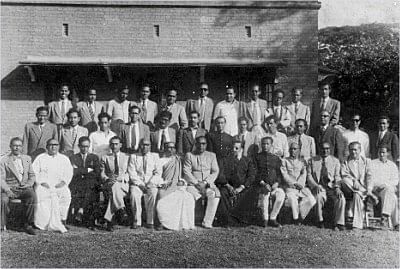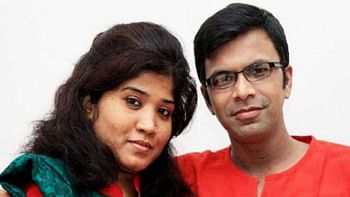National Press Club turns 57: My reminiscences

Caption of the photo: H S Suhrawardy, Prime Minister of Pakistan visited the Press Club in 1958. Provincial Chief Minister Ataur Rahman Kdhan along with his cabinet colleagues and Tofazzal Hussain Manik Mia, Editor of the Daity Ittefaq and members of the Press Club are also seen in the photo. The photograph was taken on the western side of the old Press Club building. Courtesy: Syed Badrul Haque
The fifty-sixth founding anniversary celebration of the National Press Club has just been rounded off with a fortnight-long programme amidst jubilation. Over the period, the club embraced changes in its perspective and personality and remained responsible to its social obligations. As a witness to its evolution, here are some of my nostalgic snapshots of the earlier days of the Press Club.
In 1962, it brought out a historic procession, led by legendary editor Moulana Mohammad Akram Khan, protesting the repressive Press and Publications Act promulgated by the martial law regime of Ayub Khan. The martial law regime was forced to abrogate the law promptly. In the annals of press freedom it serves as an inspiration against any repressive law to curb press freedom.
The same year, Press Club members, nay the journalist community, brought out a peace march in the city streets in a bid to stop communal riot in Wari, a part of Old Dhaka, in response to the call of humanity. Furthermore, Pres Club allows non-members to hold programmes in the club precincts without any discrimination. On important issues it organises meetings, seminars and press conferences as well.
In the fifties, Dhaka's newspaper world was much smaller, but it was more cohesive and well-knit as an entity. It adds to the credit of our elder editors like Abdus Salam, Tofazzal Hossain Manik Mia, Zahur Hossain Chowdhury, Mujibur Rahman Khan (first president of the Press Club), Khairul Kabir and A.M.A. Azim that they were able to get two acres of land for Press Club on Topkhana Road in Ramna area from the government of East Pakistan in 1954.
The two-storied red building, nestling amongst old trees with a sprawling garden in the front, lent an old world charm to its environs. Built in 1905, the building was originally earmarked to accommodate the ministers of Assam-Bengal province, and was transferred to Dhaka University after Partition. Notably, Satyen Bose, the illustrious professor of Dhaka University, once occupied the building. The government, however, took over the building after Partition and used it as residence of ministers.
Mentionably, although the Press Club started functioning in its old building from 1954, its legal documents were signed as late as in 1979. On February 17, 1979, President Ziaur Rahman laid the foundation stone of the new building of the National Press Club.
In the initial years, the number of Press Club members was not large enough to support such an establishment. The overall situation of the Press Club, however, started improving when Abdul Matin, a senior journalist who was a strict disciplinarian, took over as general secretary of the Press Club, a post which he had held for four consecutive terms.
Old timers would recall Abdul Matin used to approach the club members individually to realise the club dues in those defining moments of the Press Club. That was indeed a gesture of high note especially in those days. The Press Club honoured him with life membership. Ironically, since he had left his home country for England in the sixties, he never visited the Press Club, which he had nurtured virtually from its inception.
Over the period, the National Press Club gained in stature and emerged to be an important institution at national level. Now it is the apex club for the Press Clubs that have come up in most parts of the country. It has practically become a second home for club members, whose number now stands at around eight hundred.Of the notable dignitaries who graced the Press Club were Annada Sankar Roy, Lady Baden Powell, Begum Viqarunnisa Noon and Prince Karim Aga Khan.
The Press Club soon became a common meeting place for writers, intellectuals, cultural and political activists and elites. On one occasion, I noticed that Bangabandhu Sheikh Mujibur Rahman was engrossed in reading newspaper in the guest room of the club. Wadud bhai of Barisal, a close associate of Bangabandhu, happened to be with him.
Among the editors who used to visit the Press Club quite often were Abdus Salam, Tofazal Hossain Manik Mia, Zahur Hossain Chowdhury, A.M.A. Azim, Khairul Kabir and Balan (PTI). Stalwarts in the profession like Syed Nuruddin, S.M. Ali, Shahidullah Kaiser, Sirajuddin Hossain amongst others were members of the Press Club. A.L. Khatib of Morning News, an expatriate journalist, was a permanent resident of the Press Club Journalists S.M. Ali and A.B.M. Abdul Matin also stayed for some months in the club.
On weekdays, the card-room on the first floor used to buzz with card players. The usual faces in the card-room were Shamur Rahman Khan, M.R. Akhtar Mukul, Daud Khan Majlis, Nurul Islam, Ehtesham Haider Chowdhury, Enayetullah Khan, Hasanuzzaman Khan, Samar Das, Brojen Das, Monju, Mitter and Siaful Bari. The star attraction in the card-room was, of course, Shamsur Rahman Khan, a member of the elite Civil Service of Pakistan (CSP), because of his witty and humorous remarks which everyone in the room greatly relished.
Samar Das, the musical maestro, drew everyone's notice to his "fatal" attraction for eggs, his stomach wouldn't agree to less than a twelve-egg-omlette. Press Club's coffer drew much of its resources from the card-room. Sports like cricket, badminton and table-tennis were quite popular amongst members of the club. Wahidul Huq, journalist and Tagore exponent, was judged to be the best table-tennis player.
The inseparable duo Faiz Ahmad and M.R. Akhtar Mukul were indeed good table-talkers. The club members were all ears when the two talked together in their inimitable style, injecting jokes and punches, and no matter what was the topic it flared with colour. The Club members sorely miss the presence of M.R. Aktar Mukul.
A.B.M. Musa, doyen of journalists, is a name inseparable from the Press Club, nay of the journalist community. He held the post of president of the Press Club for four consecutive terms. No matter whether he held office or not, his was a voice to take note of.
Before I sign off, I may put it on record that Showkat Mahmood, President and Kamaluddin Sabuj, General Secretary of the National Press Club deserve credit for the perceptible changes they have brought to improve the club life, along with the face-lift of the National Press Club. Surely, the club is on the right track and destined to serve its members, nay the nation, more competently in the days ahead.
Good Luck.

 For all latest news, follow The Daily Star's Google News channel.
For all latest news, follow The Daily Star's Google News channel. 



Comments